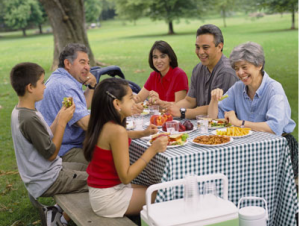
Summer has officially arrived! Like many of you, I like spending time outdoors especially having cookouts, picnics and other activities centered around food. Good food, fun, and family are my summer favorites. But before planning any outdoor food activity, here are a few simple tips to consider to ensure that unwanted bacteria won’t have a place at the table.
Wash Hands Often Bring moist towelettes or soap and water to clean your hands and surfaces often. Also, make sure your cooler is clean.
Keep Raw Meats, Poultry, Seafood and Eggs and Ready-to- Eat Foods Separate
Bring extra plates — one for handling raw foods and another for cooked foods to prevent cross-contamination.
Marinate foods in the refrigerator.
Don’t reuse marinade used on raw meat or poultry unless boiled.
Properly packing a cooler can help reduce cross-contamination that might lead to food poisoning.
Cook to Proper Temperatures
Cook your favorite foods to the right temperature by using a food thermometer; hamburger to at least 160°F and chicken breasts to 165°F.
Never partially grill meat or poultry to finish cooking later.
Refrigerate Promptly below 40°F
Pack food in a well-insulated cooler with plenty of ice or ice packs to keep the temperature below 40°F.
Transport the cooler in the back seat of your air-conditioned car instead of in your hot trunk.
Remove from the cooler only the amount of raw meat that will fit on the grill.
Defrost meat, poultry, and seafood in the refrigerator before taking them to the grill.
Don’t leave food outside in hot weather (90°F or above) for more than one hour.
Enjoy!
Stephanie
Stephanie is an Extension Associate for NC EFNEP.
Source: http://www.eatright.org/resource/homefoodsafety/safety-tips/outdoor-dining/keep-your-picnic-safe